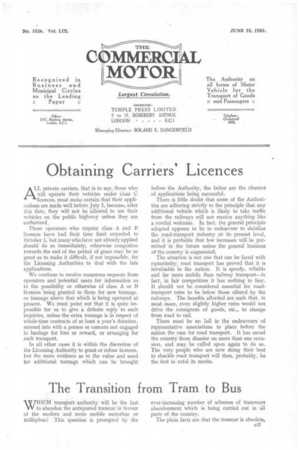Obtaining Carriers' Licences
Page 31

If you've noticed an error in this article please click here to report it so we can fix it.
ALL private carriers, that is to say, _those who will operate their vehicles under class C licences, must make certain that their applications are made well before July 1, because, after this date, they will not be allowed to use their vehicles on the public highway unless they are authorized.
Those operators who require class A and B licences have had their time limit extended to October I, but many who have not already applied should do so immediately, otherwise congestion towards the end of the period of grace may be so great as to make it difficult, if not impossible, for the Licensing Authorities to deal with the late applications. .
We continue to receive numerous requests from operators and potential users for information as to the possibility Or otherwise of class A or B licences being granted to them for new tonnage, or tonnage above that which is being operated at present. We must point out that it is quite impossible for us to give a definite reply to such inquiries, unless the extra tonnage is in respect of whole-time contracts of at least a year's duration, entered into with a person or concern not engaged in haulage for hire or reward, or arranging for such transport.
In all other cases it is within the discretion of the Licensing Authority to grant or refuse licences, but the more evidence as to the value and need for additional tonnage which can be brought before the Authority, the better are the chances • of applications being successful.
There is little doubt that some of the Authorities are adhering strictly to the principle that any additional vehicle which is likely to take traffic from the railways will not receive anything like a cordial welcome. In fact, the general principle adopted appears to be to endeavour to stabilize the road-transport industry at its present level, and it is probable that few increases will be permitted in the future unless the general business of the country is augmented.
The situation is not one that can be faced with equanimity; road transport has proved that it is invaluable to the nation. It is speedy, reliable and far more mobile than railway transport—in fact, in fair competition it has nothing to fear. It should not be considered essential for roadtransport rates to be below those offered‘ by the railways. The benefits afforded are such that, in most cases, even slightly higher rates would not drive the consignors of goods, etc., to change from road to rail.
There must be no lull in the endeavours -of representative associations to place before the nation the case for road transport. It has saved the country from disaster on more than one occasion, and may be called upon again to do so. The very people who are now doing their best to shackle road transport will then, probably, be the first to extol its merits.




























































































